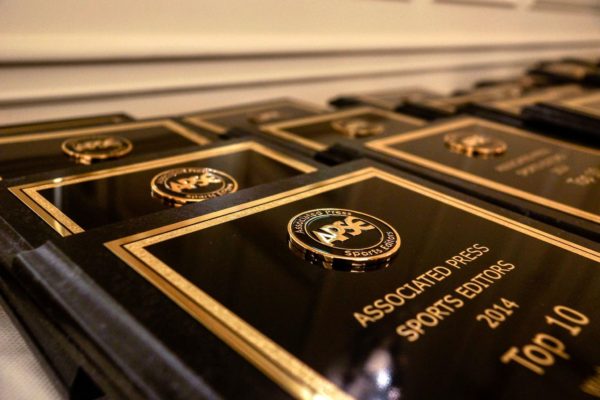 |
| Dick Schaap |
NEW YORK – Dick Schaap went about the business of journalism with a twinkle in his eye, never taking himself or his subject too seriously.
He shunned pretense and embraced people, and it didn’t matter whether his subject was a pitcher or a president, a golfer or a governor.
Schaap, who died in December, is the 2002 winner of the Associated Press Sports Editors Red Smith Award, for extended meritorious service to sports journalism.
Voting was by past APSE presidents and past winners of the award. Dallas Morning News sports editor Dave Smith, who qualifies on both counts, said there were 20 names on the ballot, and "Dick was the overwhelming winner."
Schaap carefully straddled the world of sports and news, broadcast and print, comfortable in all four environments.
He brought the same passion to the story of comedian Sid Caesar’s recovery from drug and alcohol addiction as he did to the autobiography of football and baseball star Bo Jackson.
The Caesar piece won an Emmy for cultural reporting. The Jackson book, "Bo knows Bo," was the best-selling sports autobiography ever.
"No one was more tolerant of human frailty, no one was more generous and no one was more fun," author David Halberstam said at a memorial for Schaap. "He was a very good reporter, but a better human being."
Schaap’s son, Jeremy, a sportscaster at ESPN, said his father was a Renaissance man, equally at ease talking about world affairs or pennant races.
"He was just as good at 500 words as he was at 15,000," Schaap said. "He could write a column and a book and everything in between. I miss him in so many ways, as a father, as a journalist and as a fan.
"He was never jaded. He was the hardest working man I knew. And he loved every second of it."
A measure of Schaap’s impact is that months after his death, he continues to win awards.
Besides the APSE Red Smith Award, he was the first journalist inducted into the True Heroes of Sport Hall of Fame by the Northeastern University Center for Sport and Society.
Schaap also won his fourth sports Emmy in April, this one for his autobiography, "Flashing Before My Eyes." The Emmy is called the Dick Schaap Outstanding Writing Award.
His autobiography was the last of 33 books written by Schaap. He won two other Emmys for features on "20/20" and "World News Tonight" at ABC, where he worked for 20 years, and four at ESPN.
He also received the Lifetime Achievement Award in Sports Journalism from the Crohn’s and Colitis Foundation of America last year. He won the Northeastern Award for Excellence in Broadcast Sports Journalism in 1986 and the Women’s Sports Foundation Award for Excellence in Covering Women’s Sports in 1984.
Schapp graduated from Cornell University in 1955 and attended the Columbia University Graduate School of Journalism on a Grantland Rice Memorial Scholarship.
His versatility was obvious from the start. He was city editor and a columnist for the New York Herald Tribune and later was editor of Sport magazine.
The Tribune connection was important because Schaap had grown up admiring Smith, the paper’s sports columnist.
"To read Red and then go to the same paper meant so much to him," Jeremy Schaap said.
Schaap approached his subjects with curiosity, always interested in what made them tick. "He went through life amused," his son said.
His sense of whimsy occasionally got him in some trouble.
When he was at Sport, he decided the NFL and everyone else was taking the Super Bowl entirely too seriously. So he dispatched players Fred Dryer and Lance Rentzel to a pre-game press conference in New Orleans, dressed them up as 1930s-era reporters and had them pop clich questions at the coaches.
It was a bit of levity the event needed, a reminder that this was, after all, just a football game. The NFL, however, was not amused.
At the time of his death, Schaap hosted a lively half-hour sports roundtable on ESPN called "The Sports Reporters." In the first show after his friend died, panelist Mitch Albom of the Detroit Free Press summed up Schaap.
"He’s been in heaven for a little under two days and he’s still shaking hands with people up there," Albom said. "That’s how many people he knew."





